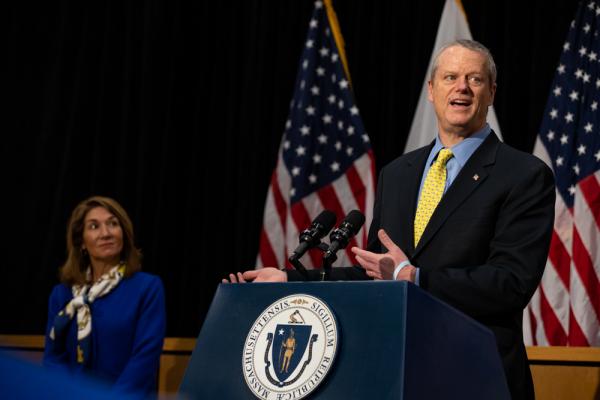May 1, 2020

Gov. Charlie Baker said original projections indicated that a person with COVID-19 would have 10 close contacts who needed to be reached out to, but the average number so far "is actually only two." Sam Doran/SHNS photo
Around 5,000 people, both COVID-19 patients and people they've interacted with, have been contacted through a community tracing program that Gov. Charlie Baker said will be "a key element toward not only stopping the spread" of the contagious disease but also understanding who's been affected.
"We literally spent most of the month of April sort of standing this thing up, and I would say that the early returns are good, but we have a long way to go here and we'll have a lot more to say about it in the coming weeks," Baker said during a press briefing Thursday.
Baker on April 3 announced the launch of a new tracing program, a collaboration with the nonprofit organization Partners in Health, intended to identify the close contacts of people who test positive for COVID-19, inform them of possible exposure and offer isolation resources. At the time, Baker described it as a first-in-the-nation effort and said officials hoped to have about 1,000 people working on the team by the end of the month.
Almost four weeks later, Baker said there are now "just about" 1,000 people on board.
Baker said original projections indicated that a person with COVID-19 would have 10 close contacts who needed to be reached out to, but the average number so far "is actually only two."
"That's a very good sign because it means that the work all of you and we have done here in Massachusetts to stay home, to separate, to socially distance, and to take seriously this idea that all of us have a role to play in reducing the spread has made a big difference," he said.
Baker urged people to answer the phone if they receive a call from the tracing collaborative -- they come from a number with an 833 or 857 area code, he said, and the caller ID will say "MA COVID Team" -- and provide the relevant information.
"The calls have actually lasted longer than people originally anticipated they would because folks who are in this situation had a lot on their mind and really appreciated the chance to have a chance to talk to somebody about what their concerns were what their questions were and how those concerns and questions could be addressed by the commonwealth and by the folks at Partners in Health," he said.
Baker said there have been conversations about incorporating smartphone data into contact tracing efforts, but that trust and credibility are central components of the program.
"That means if we incorporate something like the types of technology you're talking about into this, we're going to have to do it in a way that makes people feel comfortable that they're not giving up some of their privacy and confidentiality because we incorporated an electronic app into the process," he said, in response to a reporter's question.
Baker said the state continues to monitor the rates of positive COVID-19 tests and hospitalization of patients. He said the state processed 11,118 tests Wednesday, and 1,963 were confirmed positive, for a positive rate of about 17.7 percent -- down from a "previous high that was much closer to 30 percent."
The governor said the lower rate "is a good sign because we test a lot more than we did a few weeks ago and we've also tried to test in places where we're particularly concerned about the potential of community and organizational spread."
COVID-19 hospitalization rates, Baker said, "have been pretty flat now for about 15 days in a row," and officials continue to watch for a "downward trend" in hospitalizations.
"We have, in fact, bent the curve. We did, in fact, reduce the spread," Baker said. "We are now living with a plateau that I'm sure all of us would like to see dip a little bit so that we can move a little more quickly with respect to what a reopening strategy would look like."
The economic reopening advisory group chaired by Lt. Gov. Karyn Polito and Housing and Economic Development Secretary Mike Kennealy has started meeting with employers, business organizations and municipalities, and is setting up listening sessions around the state, Baker said.
He said brick-and-mortar retailers "have been very hard hit" and are "of particular interest" to many municipal officials. Baker earlier this week extended his order closing non-essential businesses to workers, customers and the public until at least May 18.
The first stage of a gradual reopening process in Maine begins on Friday, with some businesses including hair salons, outdoor recreation facilities and car washes able to reopen if they comply with certain safety precautions.
Baker said he talks regularly with colleagues across the region and Maine Gov. Janet Mills has "made very clear" the repoening there will be done in a careful way. He said that most people who talk about a phased reopening are starting with "parts of your economy where people can create the distancing because of the nature of the work that they do."
"I think you're going to see that being the approach that a lot of people take which should limit, in many cases, some of the concerns about the cross-border stuff," he said.
Golfers have been calling for Baker to reopen courses here -- a "Please Let Massachusetts Golf" online petition has more than 36,000 signatures. Baker said he knows people from Massachusetts who have traveled "to other states in the region to golf, but they haven't gone to Maine."
"I don't think anybody's going to drive from Massachusetts to Maine to go to a barber shop," he said. "Maybe they will, I don't know."
Topics:


